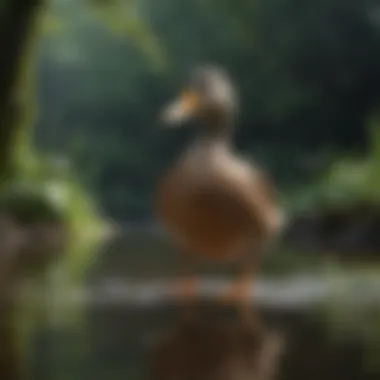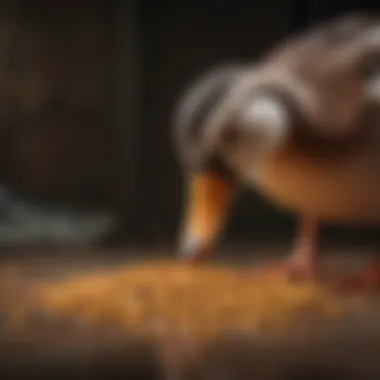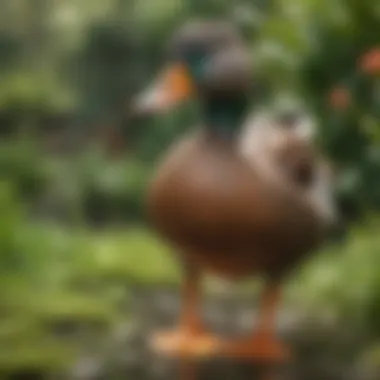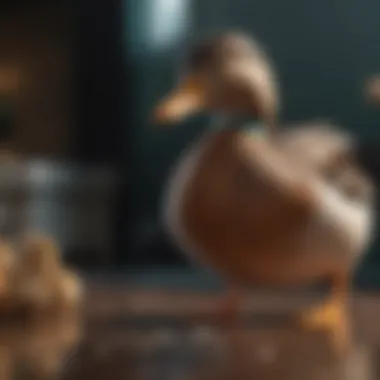Understanding the Costs and Considerations of Pet Ducks


Intro
Owning a pet duck can be a fulfilling experience for many individuals. However, it comes with specific challenges and responsibilities that every prospective owner should understand. The financial commitments and practical considerations can sometimes be overlooked in the excitement of bringing home a new companion. In this article, we will take a closer look at various aspects of duck ownership, providing insights into how to ensure a rewarding relationship with these water-loving birds.
Care Tips
Taking proper care of a pet duck involves certain daily routines that must be adhered to for the health and joy of both the owner and the duck. Here, we break down the essential elements of duck care.
Daily Care Routines
Pet ducks require a consistent daily routine. Their day typically begins with feeding. Provide them with a well-balanced diet, mainly consisting of high-quality duck pellets and fresh greens. Clean water should always be available for drinking and bathing. Observe their behavior, as birds exhibit clear signs of happiness or distress through their actions.
Cage Setup and Maintenance
Ducks need a secure and hygienic living environment. Ensure the cage is large enough for the bird to move freely. Use materials that are easy to clean and hygienic. Regularly disinfect the area to prevent the buildup of feces and unpleasant odors. Adding outdoor space where ducks can roam safely increases their quality of life significantly.
Hygiene and Cleaning Practices
Maintaining a clean habitat is crucial. Daily spot cleaning should be done to remove droppings. At least once a week, a full cleaning should take place. Replace bedding materials and clean food and water containers. Careful attention to hygiene helps prevent illnesses.
Seasonal Care Adjustments
With changing seasons, ducks require different adjustments. In colder months, ensure their living quarters are insulated and provide bedding to keep them warm. In summer, provide shaded areas and ensure they stay hydrated as they can quickly overheat. Being attentive to these needs will contribute to the ducks’ overall well-being.
Behavioral Insights
Understanding the behavior of a duck enhances the owner’s experience. Ducks communicate non-verbally through body language and vocalizations. It’s vital to interpret these signals to support their mental health.
Understanding Bird Body Language
Ducks express themselves in various ways. A relaxed duck often sways its neck gently, while a raised tail indicates alertness. Pay attention to these signs and adjust your interactions accordingly.
Common Behavioral Issues and Solutions
Some common behavioral problems, such as biting, may arise from fear or lack of socialization. Address these issues using positive reinforcement techniques. Never resort to punishment, as it will harm the bond between the duck and the owner.
Positive Reinforcement Techniques
Using treats to reward good behavior encourages desired actions in ducks. Establish small training sessions to break bad habits and help them learn basic commands, fostering a positive relationship.
Social Interaction Needs
Ducks are inherently social animals. They thrive in the company of other ducks. Consider having more than one duck to please them socially and reduce behavioral issues stemming from loneliness.
Nutrition Guides
To ensure optimal health, it’s essential to provide a proper diet backed by an understanding of what constitutes nutritious food for ducks.
Essential Diet Components
Ducks require a varied diet that consists of:
- Formulated duck pellets, which provide necessary protein.
- Fresh vegetables, such as leafy greens.
- Calcium sources like crushed oyster shell for strong eggshells.
Safe and Toxic Foods
Not all foods are suitable for ducks. Avoid items such as chocolate, caffeine, and avocados. Research carefully any food before introducing it to their diet to prevent health complications.
Supplements and Treats
Occasionally, supplemental vitamins may be beneficial. Treats like corn, bugs, or cooked rice can be introduced to enhance their motivation during training. These should be given sparingly to maintain a balanced diet.
Feeding Strategies for Different Species
Different duck breeds may have slightly varied dietary preferences. Research specific dietary requirements according to the breed, as some may have unique nutritional needs.


Wellness and Health
Maintaining health is crucial for the longevity of pet ducks, as they can be susceptible to various illnesses like any other animal.
Routine Health Checkups
Routine veterinary visits are critical. Even without apparent health issues, a checkup can help monitor signs of stress or early illness. Annual checkups allow for preventive measures to be taken.
Identifying Symptoms of Illness
Watch for various warning signs like lethargy, lack of appetite, or changes in droppings. Quick identification of symptoms is fundamental in preventing serious health issues.
Preventative Care and Vaccinations
Keeping ducks vaccinated is integral to protect them from infectious diseases. Talk with a veterinarian about the proper vaccination schedule according to your region and the specific needs of your pet.
Mental and Emotional Well-being
Mental health is equally important. Ducks need mental enrichment and stimulation to thrive. Activities like exploring, playing, and interacting with humans or other ducks ease their boredom, reducing negative behaviors.
Enriching Activities
Engaging your pet duck can improve their quality of life significantly.
Toys and Playtime Ideas
Introduce suitable toys made from safe materials. Things such as balls or floating toys can keep ducks entertained and active.
Training and Tricks
Teaching tricks enhances mental stimulation and strengthens the bond between owner and duck. Simple commands like
Foreword to Pet Ducks
Owning a pet duck has gained attention in recent years. Many people discover the joy and attraction that come with having such a unique animal around. Ducks offer various benefits. They can have distinct personalities, and their friendly nature makes them enjoyable companions. However, there are many considerations before taking this step.
Understanding the dynamics of keeping a pet duck can help potential owners make an educated decision. It is essential to evaluate factors like care needs, housing space, and social interactions. Responsible ownership emerges from fully grasping both costs and care requirements beforehand.
Understanding the Appeal of Ducks as Pets
Ducks possess qualities that differ remarkably from traditional pets such as cats or dogs. Their gentle interaction, unique vocalizations, and appealing visual appearance are only a few factors luring people towards duck possession. Pet ducks can become quite affectionate and develop bonds with their owners.
They often exhibit curious and playful behavior, making them fun to observe. Their antics in water add considerable enjoyment and mean they provide entertainment. Additionally, ducks can help with pest control in gardens, as they naturally consume insects.
It is crucial to note, though, that each duck has an individual personality. Some breeds may be more social than others, requiring careful thought when selecting one. Also, if you are considering owning a duck, it is important to consider the variety such as Pekins, Khaki Campbells, or Welsh Harlequins.
Common Duck Breeds for Pet Ownership
The choice of duck breed plays a significant role in ownership experience. Each breed comes with its characteristics, needs, and level of care.
- Peking Ducks: Known for their robust body shape and white feathers, they are friendly and readily adapt to various environments. They are often active and curious.
- Khaki Campbells: They are famous for being excellent egg layers. Their calm demeanor makes them suitable for families.
- Welsh Harlequins: They are also known for good egg production. Their striking colors and friendly nature draw the attention of many enthusiasts.
- Indian Runner Ducks: Known for their upright stance and skill at foraging, they are lively and entertaining to have around.
Choosing the right breed requires examining not only the property you have but also lifestyle choices. There must be due consideration about time commitments for attention, care, and housing.
It’s not just about whim after all; comprehending the overall responsibilities involved affects the well-being of both you and your pet.
Initial Purchase Costs
Understanding the initial purchase costs is fundamental when considering the ownership of a pet duck. This section lays the groundwork for prospective duck owners, elucidating the financial implications associated with acquiring these waterfowl companions. Acquiring a pet duck involves not just the upfront costs but also the long-term financial commitment it entails. Knowing these aspects can guide potential owners in making an informed decision, ensuring readiness in embracing all responsibilities that come with caring for a duck.
Average Price of Ducklings
When it comes to purchasing ducklings, prices can vary based on breed and location. On average, the cost of a duckling ranges from $5 to $20. Specialty breeds may incur higher prices, sometimes reaching up to $50 or more. Local breeders and hatcheries often provide a better estimate of the current market value. Keep in mind that buying in bulk can occasionally lower the per-unit cost. While initial pricing is essential, prospective owners should also consider the quality of the breeder’s stock since healthier ducklings will lead to fewer problems later on.
Adult Duck Prices


The prices for adult ducks typically rise significantly compared to ducklings. Depending on the breed, the average price stays between $15 to $100. Financial variations emerge from factors like gender, age, and health status. For example, breeding stock generally costs more due to their potential for reproduction. Furthermore, purchasing an adult duck comes with considerations on temperament and adaptability as well. Ensuring proper socialization practices aid in finding a well-adjusted duck.
Factors Influencing Cost
Several variables influence the overall cost of acquiring a duck. A few critical determinants include:
- Breed Selection: Recognized breeds like Pekin, Khaki Campbell, and Indian Runner can differ in price.
- Age and Gender: Female ducks that are breed-specific can command a premium, especially in liquidating eggs.
- Health Status: Vaccination status and the breeder’s reputation can also impact final costs. Healthy and well-cared-for ducks, while perhaps pricier, are a better choice for the responsible owner.
Overall, understanding these factors paired with a continual assessment of your budget is crutial before proceeding with a purchase. Make sure to adjust expectations accordingly as financing a pet duck goes beyond its initial price tag, pushing towards important ongoing expenses.
Ongoing Maintenance Expenses
Owning a pet duck is more than just an initial cost. It involves a consistent commitment to ongoing maintenance expenses. These costs affect your budgeting and assure that your pet duck's needs are met throughout its life. Understanding these expenses fully prepare prospective duck owners for all they will face after the initial acquisition. It is vital to appreciate that ducks, like any pet, require daily attention and resources. In this section, we focus on feeding and nutrition requirements, housing and shelter costs, and healthcare considerations that carry implications on the overall ownership experience.
Feeding and Nutrition Requirements
Feeding a duck will largely depend on its breed and size. Ducks are omnivores. A well-rounded diet goes beyond what you might think. You cannot just rely on leftover bread and scraps. Proficient nutrition contributes to the duck's growth and wellbeing.
Duck Diet Essentials
- Commercial duck feed: This is essential for good growth. It provides the necessary nutrients. Brands like Duck Layer Feed are designed for adult ducks.
- Fresh vegetables: Ducks enjoy munching on veggies, including leafy greens and peas.
- Grains: Providing oats and corn helps diversify their diet.
- Access to clean water: Ducks need water not just for drinking but also for digestion and bonding.
Understanding the dietary needs promotes happy ducks and potentially lowers future healthcare costs caused by improper nutrition.
Housing and Shelter Costs
Ducks need proper shelter both outdoors and indoors, influencing expenses. Their living conditions affect their health, happiness, and welfare.
Requirements for Outdoor Shelters
- Size: Ducks require more space than many assume. A minimum of four square feet per duck indoors is advisable. Outdoor space should allow them to exhibit natural behaviors like foraging and swimming.
- Protection from predators: Secure walls, roofs, and flooring protect against threats. Costs for sturdy materials can add up.
- Clean bedding: Straw or wood shavings are common bedding materials. Regular changes are a must to maintain hygiene, which can also add to maintenance expenses.
In general, better housing can minimize stress and health issues, ultimately benefiting the duck's longevity.
Healthcare Considerations
When it comes to healthcare expenditures, you need to prioritize vet services to ensure a healthier life for your duck.
Vet Visits
Vet visits are critical to ensure that your duck stays healthy. Regular check-ups help in early detection of any illnesses. Getting an annual check-up can cost around $50 to $100 depending on your vet. Some crucial points to remember are:
- Expertise in avian care is necessary. Not all vets cater to ducks.
- Ensure vaccines are up to date. Vaccination further prevents enticing costs and health emergencies down the road.
By recognizing the importance of vet visits, pet duck owners can maintain their pet's health and create a better ownership experience.
Preventative Care
Preventative care includes vaccinations and regular check-ups, plus keeping ducks stress-free from environmental factors affecting their health.
- Hygiene: Proper sanitation lowers illness risk.
- Signs & Symptoms: Being attuned to your duck's behavior can help in catching problems early. Knowledge empowers quick decision-making, ensuring you are providing the best companion care.
- Cost-effective solutions: Early intervention generally lowers potential major vet bills in the future.
By emphasizing preventative care, you incur satisfactory advantages for your investment in a pet duck, allowing you to create a safe environment that ensures your duck’s growth and health.
Essential Housing Requirements
Owning a pet duck involves understanding their specific housing needs. Unlike typical household pets, ducks require both indoor and outdoor spaces for their wellbeing. For potential duck owners, ensuring a safe, functional, and comfortable environment is crucial for their social and physical health. Poor housing can lead to behavioral problems and health issues, making this aspect of pet ownership a top priority.
Creating a Safe Outdoor Environment
Ducks spend most of their time foraging and exploring when outside. Therefore, a secure outdoor area is vital. Below are the key elements to consider:
- Fencing: A sturdy fence is important to prevent predators from accessing your ducks. Materials like welded wire or chain link are effective.
- Space to Explore: Ducks need space to roam. A minimum of 10 square feet per duck is a general recommendation for interaction and freedom.
- Water Access: Ducks love to swim. A shallow pond or kiddie pool allows them to wash and dip their heads, which also aids in maintaining their eye and skin health. Keep the water clean and connected to their grazing area to avoid unnecessary walking.
- Protection from Elements: While ducks have some level of weather resistance, they need protection from extreme heat and cold. Provide shaded areas and insulated, dry nesting spaces for comfort.
- Foraging Opportunities: Ducks enjoy foraging behavior that encourages natural skills. Using a mosaic of grass, clover, and dandelions mimics their natural habitat and keeps them mentally stimulated.
Creating an appropriate outdoor space not only prioritizes the ducks' safety but also promotes natural behaviors, contributing to their happiness and physical health.


Indoor Living Space Considerations
Indoor environments are equally important for duck care. Here are aspects to note for a suitable living space:
- Size and Space: Ducks are social animals that do best in groups. Make sure the indoor area allows free movement. At least 4 square feet per duck is advisable.
- Bedding Material: Use bedding such as straw, hay, or wood shavings. This will help absorb moisture and create a comfortable surface for resting while also facilitating simpler clean-up.
- Ventilation: Adequate airflow helps in controlling foul odors while maintaining a fresh environment. Duck houses should have vents positioned away from direct drafts.
- Safety Precautions: Ensure electric cords and toxic plants are out of reach. Ducks are naturally curious and tend to explore everything, even things that might be harmful.
- Light: Natural or sufficient artificial light is necessary. Ducks benefit from a 12-hour light and dark cycle for healthy growth and behavior.
Both indoor and outdoor housing facilitates an environment where ducks can thrive, contributing significantly to their happiness and overall health.
Social and Behavioral Needs
Understanding the social and behavioral needs of a pet duck is fundamental for ensuring their well-being. Ducks are inherently social creatures. Recognizing this trait can lead to happier and more fulfilled pet ownership. When ducks are kept, it is crucial to acknowledge the environments where they thrive. Ducks require social interaction, mental stimulation, and certain behavioral outlets in their daily lives.
Understanding Duck Behavior
Ducks exhibit specific behaviors that are essential to their welfare. For example, they engage in foraging, which is a natural instinct where they search for food. This activity enhances their mental health by keeping their minds active. Additionally, ducks communicate through a series of vocalizations. Understanding these sounds can help you respond appropriately to their needs. Furthermore, aggressive or competitive behaviors may arise if ducks feel threatened or if resources are scarce.
Another notable behavior is bathing. Ducks have distinct grooming habits. They often preen their feathers to keep them clean and waterproof. This also provides comfort and contributes to overall health. Observing these behaviors informs pet owners about the environmental needs necessary for their ducks.
Among various interactions, ducks display a hierarchy among themselves within flocks. It's essential to pay close attention to the dynamics to prevent distress in your flock.
Importance of Companionship
Companionship is vital for pet ducks. Keeping at least two ducks of the same breed can improve their quality of life. Ducks are more than just pets; they thrive on social interaction, whether with humans or other ducks. The lack of companionship can lead to boredom and behavioral issues such as feather picking or lethargy. Many owners report significant improvements in behavior when ducks have a buddy.
In addition to other ducks, pet owners should spend quality time interacting. This can create a strong bond, which may aid in training and make handling easier. Engaging ducks with toys or safe objects can fulfill some of their mental and physical activity needs. They enjoy experiences that replicate their natural behavior, such as foraging for food or exploring their surroundings together with their companion.
Ducks also display affection in several subtle ways. They may nuzzle or follow their owners around. Thus, recognizing these signals contributes to a nurturing home environment. To conclude, appreciating and addressing ducks' social and behavioral needs leads to happier and healthier pets.
Legal Considerations
Understanding the legal considerations of owning a pet duck is imperative for any potential owner. This aspect safeguards not only the welfare of the ducks but also ensures compliance with local regulations which could impact your living conditions and future. Depending upon your location, specific laws and guidelines surround the ownership of waterfowl, including pertinent zoning laws. Registering is often a vital procedure when keeping animals, and neglecting this can result in penalties or the inability to keep your pet ducks.
Many countries or regions possess established frameworks detailing which animals can be owned and under what conditions. The enforcement of animal welfare imparts basic rights and sets minimum standards for care, transportation, and responsible breeding. Engaging with these laws shields both the owner and ducks from potential abuses and neglect through obligations of care.
Local Animal Laws and Regulations
Each area has distinct laws governing the ownership of animals, including ducks. Understanding these local laws influences these factors:
- Permits Required: Some areas may demand permits to keep ducks. These permits usually require accurate documentation about housing and care plans.
- Species Limitations: Certain species of ducks may not be permitted for ownership, particularly if they are considered exotic or do not comply with local wildlife laws.
- Regulations on Care Standards: Many local laws define minimum conditions for the upkeep of domestic animals, including adequate shelter and nutrition,
General awareness and comprehension of local animal laws can prevent misunderstandings between neighbors and law enforcement authorities. It promotes beautiful cohabitation within the community.
Zoning Restrictions for Ducks
Zoning restrictions can significantly affect where you can keep a pet duck. It's crucial to analyze your property’s zoning designation, which is defined by local government ordinances. Here are some key merits related to zoning systems that aspiring duck owners might need to know:
- Primarily Residential or Agricultural Zones: Many residential zones have strict limitations on outdoor animals thus restrictions contain how many ducks you may sustain as well as where their dwelling may be situated.
- Density Restrictions: In urban areas, only a certain number of animals are allowed per household. Knowing this will give valuable insights into planning for the living arrangements before getting a duck.
- Noise Ordinances: There might be stipulations regarding noise levels especially due to quacking, ensuring peace and quiet that benefits neighbors. Violations could arise from excessive noise in these quick-tempered environments.
It is essential to familiarize yourself with these limitations prior to purchasing a duck. Engaging proactively in the nearby community allows for smoother relations and also paves way to enhanced duck keep as planned without future hindrances.
Local laws and zoning ordinances play a crucial role in determining whether you can legally keep ducks in your area. Not adhering to these rules can lead to fines and displacement of the animals.
End
Owning a pet duck is not a trivial pursuit. This article emphasized several crucial points that should always be considered by potential duck owners. Understanding the cost elements, including initial expense, ongoing maintenance, and needs for housing complexity, forms the backbone of making an informed decision that suits one's lifestyle. Aside from finances, ducks require an environment that addresses their health and social needs, necessitating ongoing commitment and resources.
Evaluating the Commitment Required
Before bringing a duck into your life, it is essential to honestly assess the commitment involved. Ducks are unique animals with specific behaviors and care needs. They are not merely ornamental pets; their daily routines involve feeding, sheltering, and socializing just as with more common domestic pets. This translates to an investment in time and energy.
- Daily Care: Ducks require regular feeding and water access. It’s crucial to establish routines that prioritize their health and contentment.
- Social Structures: Ducks thrive in social environments and should ideally have companionship. This might mean acquiring multiple ducks.
- Regular Space Maintenance: Keeping their living area clean is important to prevent health issues. Regularly being on hand to monitor their environment requires dedication.
All of these elements reflect the extensive responsibility you take on when deciding to own a duck. Owners must create a suitable habitat and ensure a steady commitment to the well-being of their feathered friends.
Making an Informed Decision
When transitioning from consideration to action, making an informed decision is critical. An understanding of not only the costs but also the lifestyle adjustments required becomes paramount. Potential duck owners should:
- Conduct thorough research about the specific breed they are interested in.
- Seek input from other duck owners, either online or in community groups, such as those found on Reddit. Sharing expirienses can give insights that will help prepreat appropiate environments.
- Evaluate local regulations governing duck ownership. Zoning laws can dramatically affect how you need to structure care and safety measures for your pets.
- Plan for long-term obligations and unexpected circumstances, whether that involves addressing health issues or managing the complexities of unexpected environmental changes.
Ultimately, ducks bring joy and companionship if cared for properly. This commitment can enrich lives in positive ways. Reading this article serves as a significant step towards understanding what it really takes to ensure happiness for your potential pet duck.















